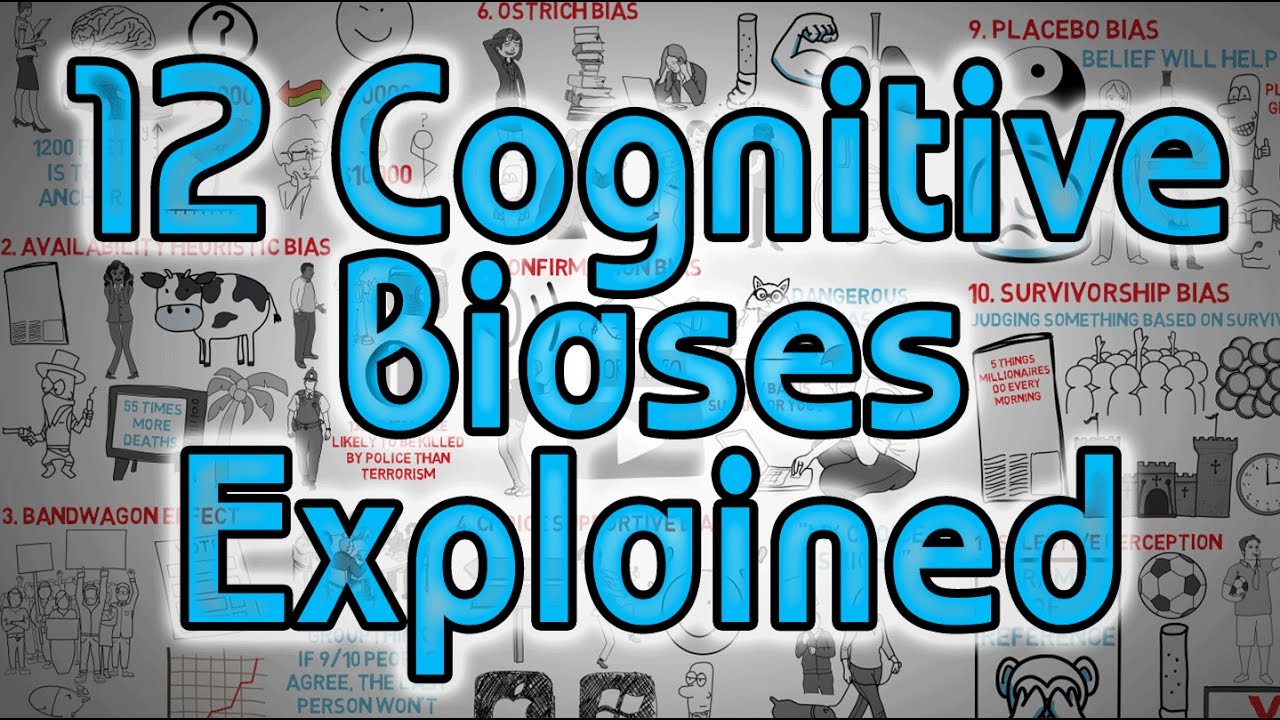Practical Psychology
We are going to be explaining 12 cognitive biases in this video and presenting them in a format that you can easily understand to help you make better decision in your life. Cognitive biases are flaws in logical thinking that clear the path to bad decisions, so learning about these ideas can reduce errors in your thought process, leading to a more successful life. These biases are very closely related to logical fallacies, which may help you win an argument or present information better.
Ismonoff: https://www.youtube.com/user/ismonofftv
1)Anchoring Bias
2)Availability Heuristic bias
3)Bandwagon Bias
4)Choice Supportive Bias
5)Confirmation Bias
6)Ostrich Bias
7)Outcome Bias
8)Overconfidence
9)Placebo bias
10)Survivorship Bias
11)Selective Perception Bias
12)Blind Spot Bias
What I make my videos with: http://bit.ly/2fPakuK
Insta: https://www.instagram.com/practical_psych/
Twitter: https://twitter.com/practical_psych
Facebook: https://www.facebook.com/practicalpsych
Check out MY Passive Income Ebook: http://bit.ly/PsychologyIncome
Source




What you are sharing are summaries & paraphrases that you've read in books & other materials. Please include your citations amd references. Thanks.
Great content!
Ofcourse I enjoyed the video. Lots of helpful information that will help us to make good rational decision and not on bias. The only complaint I have is the narrator speaks too fast and dies not give time to digest the information. Don't forget lot of your listeners are older people like me and we need little more time to process the information. Thank you. Milan
suits is incorrect. Its sweets that you are talking about!!
Politics in Amrica explained.
Wait… The Consumer Product Safety Division tested COW SAFETY? LOL
Absolutely incredible!
Anchoring Bias
Confirmation Bias
Statistic Bias
12h really caugh on me. As the video was passing i was thinking how unbiased i am haha
my English teacher actually would give us a number for every assignment and tell us not to write our names on our assignment because he said he doesn't want to be biased because he has a subconscious preference for one student over another. then he would take a separate piece of paper and write the number that correlates to each person on it and hide it in his desk until it was time to hand it back
The most toughest thing to us humans is being bias.
great great great video
Your no. 6 is a no.2 and 8 bias. Please do more research on it.
What about the "slippery slope" fallacy? Other: "Dunning-Kruger effect."
3:40 now the "pooping" part really does apply to the President.
It's great to know these ❤️
What about the thing where you don’t see what you aren’t looking for like physically. Is that confirmation bias?
Very well-explained, thank you!
I know it's bias bias bias, that's why I don't pay to kill other animals unnecessarily for burgers. ✌️
Does anyone know good material to learn how to write critically?
Whenever we are attempting to ascertain truth, you must always bear in mind the idea that we can make items apply that really don't – cognitive bias. Separating fact and speculation is difficult. Facts lead to speculation. But when you have enough facts to support the hypothesis, it becomes circumstantial evidence of truth.
The bandwagon effect is interesting. It can actually be quite logical to accept the opinion of the group. First of all you may trust the opinion of the group more than your own. Second you may not care to put in the effort to arrive at your own conclusion but it may be troublesome for whatever reason to simply not have an opinion on the matter. Third we are social creatures and it rarely pays to be the sole naysayer in a group, being accepted may be more important than being right.
That tree is not worth $30,000
Falling coconut? Is that really true? That sounds like it might fall in that 99% of all statistics that are made up on the spot. If you are unlucky enough for a coconut to fall just as you're standing under it, how would it kill you? It's not good for you. It would definitely hurt. It would probably cause a concussion but death? Maybe in a small percentage of those who its happened to but now we're talking about a VERY small number of people. Terrorism, while rare, has killed a great many people in the last few decades. Mostly around that 01 year but not all of it. That doesn't quite ring true but I could be wrong. Maybe like, coconut farmers or something spend a lot of time under coconut trees. Who knows?
Awesome VDO mate!
This is an awesome video, but it's hard to accept that in a video on COGNITIVE BIAS, the narrator would use "He" when talking about a manager, a stock trader, an election candidate and a computer buyer. In fact, I'm not sure any of his examples referred to "She." So disappointing that he would be so blind to his own bias.
A great video! It explains a lot about why FDA and FAA procedures and rules are laid out the way they are. They prevent a lot of these biases from manifesting.
(But I beg you. change the music. If you're going to have muzak, then make sure there is say 4 or better yet 8 measures before it repeats. Having it repeat every few seconds is fucking annoying.)
Wow, i watched this literally with bated breath.😁😃 I didn't want to breathe for fear I would miss one.😎 Thanks for a really excellent video.
3:40 disagree politicians poop all the time they are the masters of poop
Wished I would have known that 15 years ago. Some stuff I knew before but especially survivorship bais principle enlightened me
I didn’t realize 3000 people died from coconuts falling on them in 2001.
Double think is dangerous, don't you think?
Not me using anchoring bias for my thesis. Idk seems like the best option XD
So you say "Avengers: Endgame was a good film." Well let me illustrate the biases in that statement:
Anchoring: Infinity war was good
Availability: The poster has so many superheroes on it! All the good ones!
Choice Supportive: When it came out I bought premium premiere Imax tickets with goodie bags
Bandwagon: All my friends were hyped about it
Confirmation: All my favourite online content creators/journalists/activists praised it
Ostrich: Heaps of great movies use time travel to justify plot contrivances. Back to the Future did it thrice!
Outcome: It made SOOO much money
Overconfidence: Civil War, Ragnarok, Infinity War were well received and this is just the next one
Placebo Effect: I need this one to be good because the MCU movies released before it – Antman+Wasp and Captain Marvel – were mediocre
Survivorship: It did better than all the other movies that year
Selective: Iron Man is my favourite. He was the original. Any movie with him in it is gold
Blindspot: The film's critics just don't understand popular media
Now that you've re-judged the film, what's your opinion on it's quality?
I'm asking because I personally have no idea, as I'm not a film critic. Hated what they did to my man Thor though. Ugh.
Why am I so good at noticing biases in other people… and not in myself?
2:20 you are more likely to die from police than a terrorist but terrorist can't kill because of the police
Do you have somewhere to be? Slow down!
The speed of this video or your presentation is too fast.
not sure your example for the anchoring bias applies.
case 1:
you think you are paying 20k for a car worth 30k.
case 2:
you think you are paying 20k for a car worth 10k.
it is completely rational and unbiased (though acting under incomplete information in this case) that when paying a fixed amout of money, you prefer spending the money on the object of higher quality.
being lied to is not comparable to being biased.
so if you prefer buying milk that costs 1 dollar instead of buying milk that costs 1 dollar (discounted from 2 dollars), you are not being biased even if it is the identical product, assuming that quality reflects price. you are simply receiving deceiving information regarding quality but you are acting rationally. you can be completely rational and bias-free and still fall for lies and misinformation…no matter how rational you are, you will never be able to verify every single piece of information you are ever provided with.